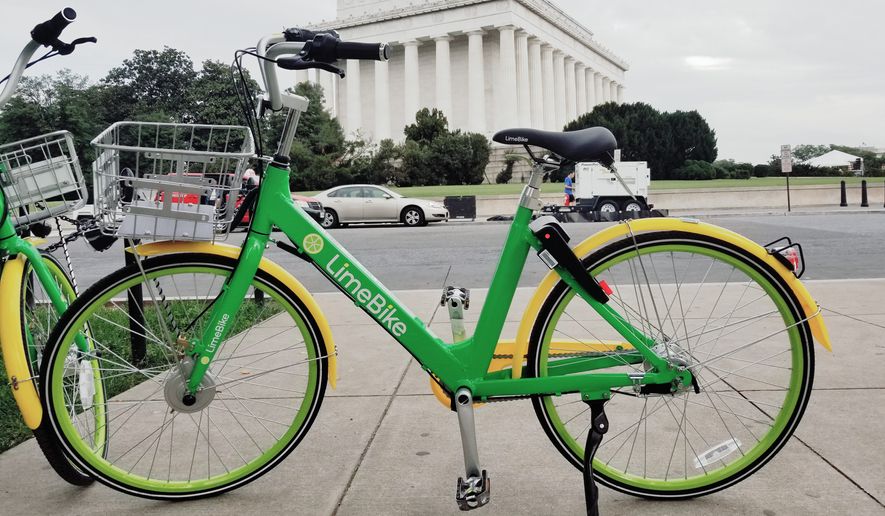You’ve seen them scattered around town — those bright, no-gear bicycles that sometimes block sidewalks or the entrances to storefront businesses.
The D.C. Department of Transportation (DDOT) has seen them too, and says it will consider how these vehicles have been parked around the city when it evaluates its dockless bike-sharing pilot program in April.
Right now, the four companies providing the city’s dockless bike-sharing services in the seven-month pilot program are responsible for informing riders how to park and operate their bicycles safely around town.
One of those companies — Limebike of San Mateo, California — says D.C. riders already have racked up enough miles on its vehicles to encircle the earth 1 times.
Since the start of the pilot program in September, city residents have cycled 36,000 miles and burned 1.1 million calories, according to a Limebike report. About 16,600 people in the District have signed up for a Limebike account and used its service, with an average trip distance of 1.1 miles and average ride time of 8 minutes.
Jason Wilde, LimeBike’s market launcher, told The Washington Times that the company currently deploys the maximum number of bikes allowed by DDOT.
“We currently sit at 400 bikes in operation in the District and those have to date yielded roughly 45k trips within DC,” Mr. Wilde said in an email, adding that this trip total does “not include trips that have taken place in Silver Spring given our launch there and close proximity.”
When it comes to performance so far, LimeBike’s report indicates that more cycling saves the District more than just calories: With 59 percent of its riders using LimeBikes during rush hour, the company says it is helping reduce car traffic. Citing calculations from the Environmental Protection Agency, the bike-sharing firm estimated that is equivalent to preventing 19,500 pounds of carbon from entering the atmosphere, or 800 trees from being cut down.
The District hosts three other dockless bike-sharing companies — Mobike, Spin and Jump — in addition to Capital Bikeshare. Data from those firms were not available.
Still, the proper parking of dockless bikes — which employ a self-locking mechanism that can be accessed with a smartphone app — will be a major issue for the future of the program: In a more serious case earlier this month, a man threw a LimeBike onto the tracks in front of an oncoming Metro train. The bike, which had been left on a train platform, caused damage to the undercarriage of the train, and delays in subway service.
However, LimeBike seems optimistic that more trips are in store for D.C. residents if DDOT approves the company for a permanent operation.
“Bike usage increases as the availability of bikes becomes more reliable,” Mr. Wilde said.
• Julia Airey can be reached at jairey@washingtontimes.com.




Please read our comment policy before commenting.